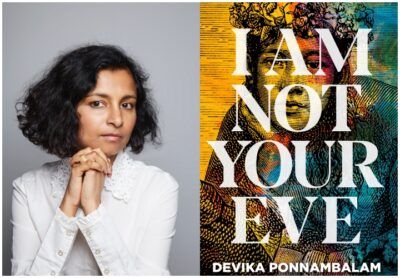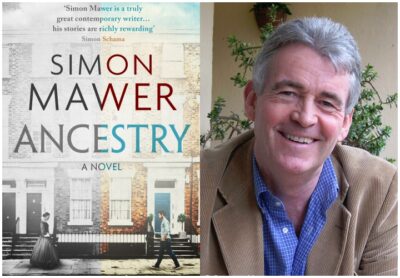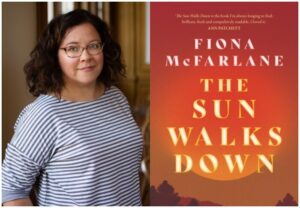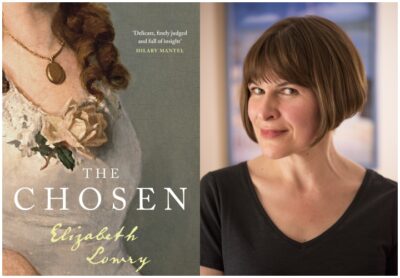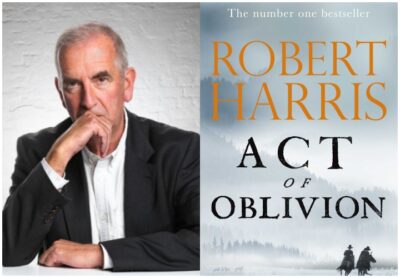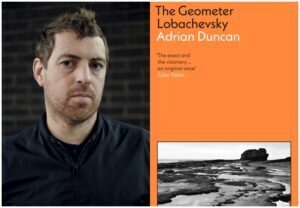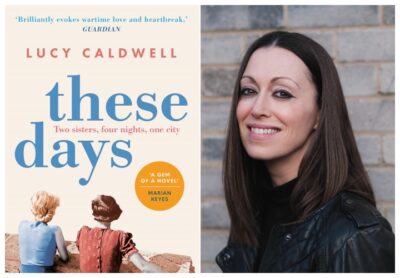The 2023 Shortlist
The 2023 Walter Scott Prize shortlist of seven is:
THESE DAYS Lucy Caldwell
THE GEOMETER LOBACHEVSKY Adrian Duncan
ACT OF OBLIVION Robert Harris
THE CHOSEN Elizabeth Lowry
THE SUN WALKS DOWN Fiona McFarlane
ANCESTRY Simon Mawer
I AM NOT YOUR EVE Devika Ponnambalam
The judges said:
‘Cat and mouse with 17th Century regicides. Love in the Belfast blitz. The death of Emma Hardy. A lost boy (and so much else) in southern Australia. A Soviet exile in Ireland. A dig into personal ancestry. The voice of a voiceless muse. Seven very different stories with very different approaches have reached the shortlist for this year’s Walter Scott Prize for Historical Fiction. And as with the best historical novels, each book offers the reader more than the story.
‘This year we explore martyrdom, self-knowledge, remorse, exile, art’s human price, complex relationships under an unsettling sun and the impossibility of knowing exactly who we are. As required by the prize criteria, all the novels on our 2023 shortlist are set sixty years or more in the past, but how vividly they speak to the present. We hope you’ll read, enjoy and watch out for the winner.’
More about the shortlisted books
You can read our series of interviews with each of the seven authors, including fascinating insights into their research and inspiration for their novels, by clicking on the links to each interview to the left of this page.
The seven shortlisted authors will be appearing at the Borders Book Festival on Thursday 15th June 2023, when the winner will be announced live on stage. Tickets are now on sale here. A limited number of tickets is also available for a Colloquium event at Bowhill House on Friday 16th June, with the seven authors and distinguished guests discussing future directions of historical fiction and much more. Don’t miss these two gatherings of world-class literary talent!
Here are the judging panel’s comments on each of the seven shortlisted books.
THESE DAYS Lucy Caldwell (Faber)
‘At the start of April 1941 it seemed that Belfast had avoided the worst of the war, compared, that is, to the industrial cities of England. That changed on the night of 7th April and the following days when German bombers devastated the city, damaging or destroying half the houses, killing and maiming many thousands and demoralising the rest.
These Days focuses on two sisters, Audrey and Emma, whose young lives will be forever changed by what they have experienced; their comfortable and secure middle-class world shattered. The juxtaposition of the horrific and mundane and the authenticity of detail makes this novel an exceptional study of the terrors and consequences of war.’
THE GEOMETER LOBACHEVSKY Adrian Duncan (Tuskar Rock Press)
‘To say that Adrian Duncan’s The Geometer Lobachevsky is the story of a man surveying an Irish bog is akin to relegating Leonardo’s Last Supper to thirteen men having dinner. Like the bog Lobachevsky is surveying, the unassuming surface conceals ‘a subterranean ocean on a gusty day’.
‘Trained as a structural engineer, Duncan brings an engineer’s precision to the thoughts, feelings, actions, observations, reminiscences and melancholy predicament of Nikolai, great-grandson of the famous mathematician. The pace is measured, the vision clear, the tensions subtle but relentless. Into an era of crash bang wallop, Duncan drops this quiet gem.’
ACT OF OBLIVION Robert Harris (Hutchinson Heinemann)
‘Robert Harris is a master at creating, in sinewy prose, vivid characters at odds with each other. In Act of Oblivion, Puritan Colonels Whalley and Goffe, signatories to Charles I’s warrant of execution, flee to America from their implacable royalist nemesis, Nayler. Under Cromwell, they were the hunters. Now they are the prey, sustained only by their unshakeable faith in the rightness of their cause.
‘Harris plants the reader directly into the time and place of the story. In a Massachusetts snow storm tiny flakes whip ‘like musket pellets in a blizzard across the dead white fields’. We feel the heat of the fire of London and lurch with the waves during a wild storm at sea. Act of Oblivion is the work of a magnificent storyteller at the height of his game.’
THE CHOSEN Elizabeth Lowry (Riverrun)
‘Elizabeth’s Lowry’s beautiful, insightful book deals with a real-life historical mystery: why did Thomas Hardy, who had openly grown tired of his wife, fall into a deep well of despair at her sudden death? His grief drew from him the poems of 1912-13, verses of extraordinary beauty and power addressed to his lost love. Combining meticulous research with a poet’s imagination, Lowry gives voice to both Hardy and to his downtrodden wife Emma.
‘The result is an extraordinary work, full of tenderness and unexpected humour. It’s a portrait of a marriage gone wrong and an investigation into the grammar of grief. Along the way, we consider the parasitic relationship art can have with life, and the transcendent power of love.’
THE SUN WALKS DOWN Fiona McFarlane (Allen & Unwin Australia)
‘Fiona McFarlane has managed that rarest of things: in The Sun Walks Down, set in South Australia in settler times, she has taken the familiar story of a lost child and transformed it.
“Against the backdrop of a landscape at once beautiful and alien, with the burning sun a character itself, the author deftly wrangles a dazzling array of characters, all trying to establish their place in the new, imagined settlement of Fairly, alongside the First Nations experience. Adults and children alike transplant traditions from their old countries into this new, strange world as they navigate an uncertain and precarious future. In this rich and empathetic novel, Fiona McFarlane has offered the reader a key to understanding Australia.’
ANCESTRY Simon Mawer (Little, Brown)
‘A family history opening on a Suffolk beach is bound to invite thoughts of David Copperfield and the picaresque novel, and Simon Mawer is bold enough to wonder in the course of his narrative how Dickensian his story might be.
‘The subject is his own family – the ancestors whom he’s uncovered like any genealogical researcher – and he refuses to choose between fiction and fact, melding their imagined lives with the documentary history of their comings and goings.
‘A former winner of the Walter Scott Prize, Mawer has written another ambitious novel, blending the wildness and weariness of war in Crimea in the 1850s (on his father’s side) with the hurly-burly of poverty-stricken life back in London (his mother’s).
‘The result is a memorable family odyssey that takes the reader deep into a fictional realm while refusing to cut the guy ropes that anchor it to the real architecture of chance and fate in a distant time, with all its drama and its workaday routine, from which he sprang.
I AM NOT YOUR EVE Devika Ponnambalam (Bluemoose)
‘Into a whirlpool of vivid and lyrical writing, Devika Ponnambalam pours Paul Gauguin’s tormented but richly creative years in Tahiti and his relationship with Teha’amana: muse, child bride and subject of his masterpiece, The Spirit of the Dead.
‘Seen principally from her vantage point but also imagining that of Aline, Gauguin’s daughter and Teha’amana’s contemporary back in Europe, Ponnambalam painfully draws out the destructive cultural clash between the French colonisers and Christian missionaries and the ancient mythologies and peoples of the Polynesian islands.
‘This is a complex novel, raising uncomfortable issues of morality and demanding much of the reader, but it is deeply rewarding.’

